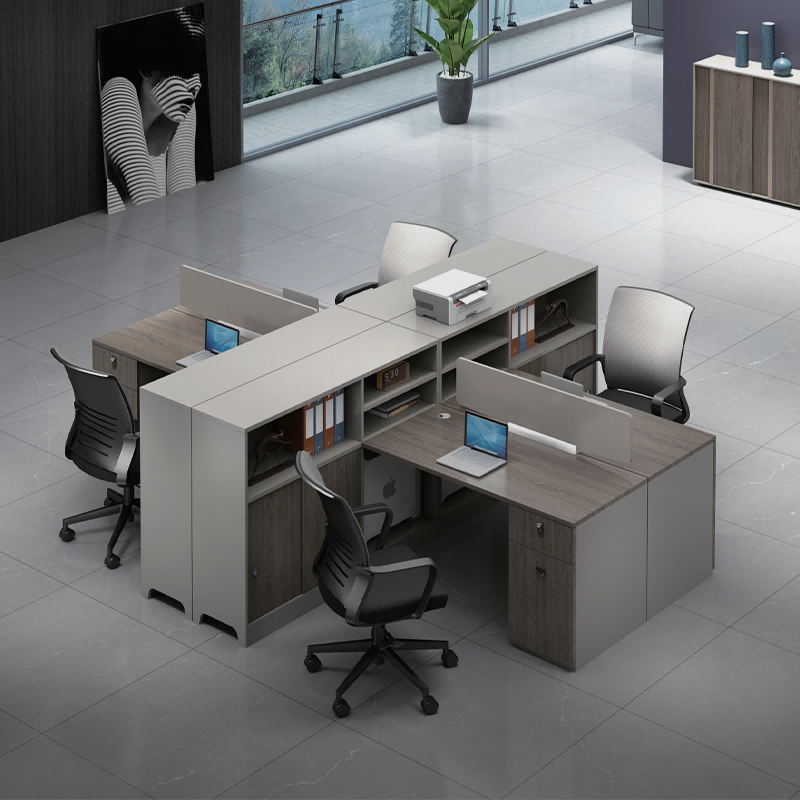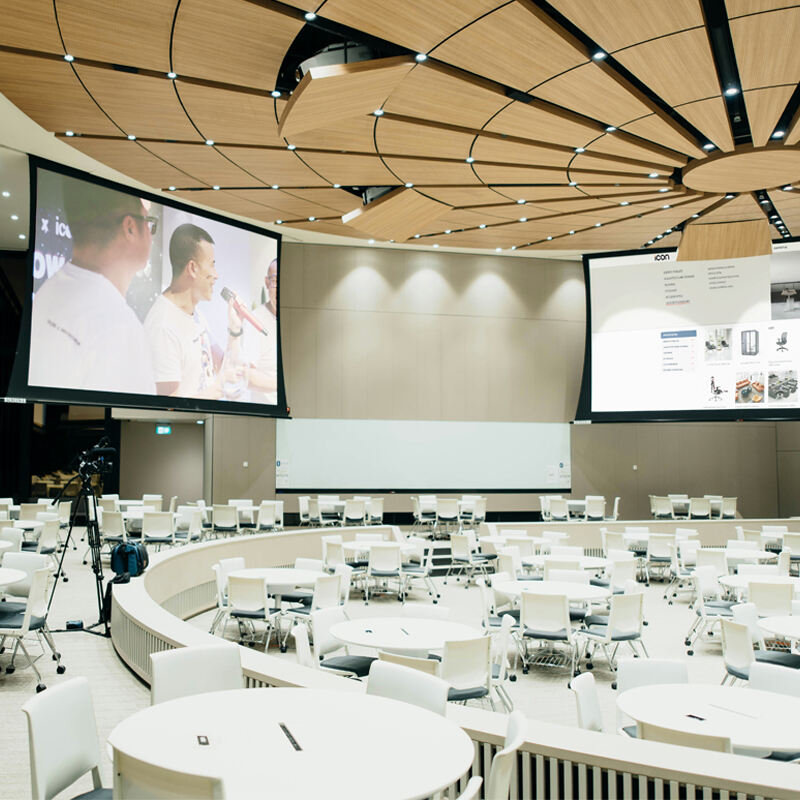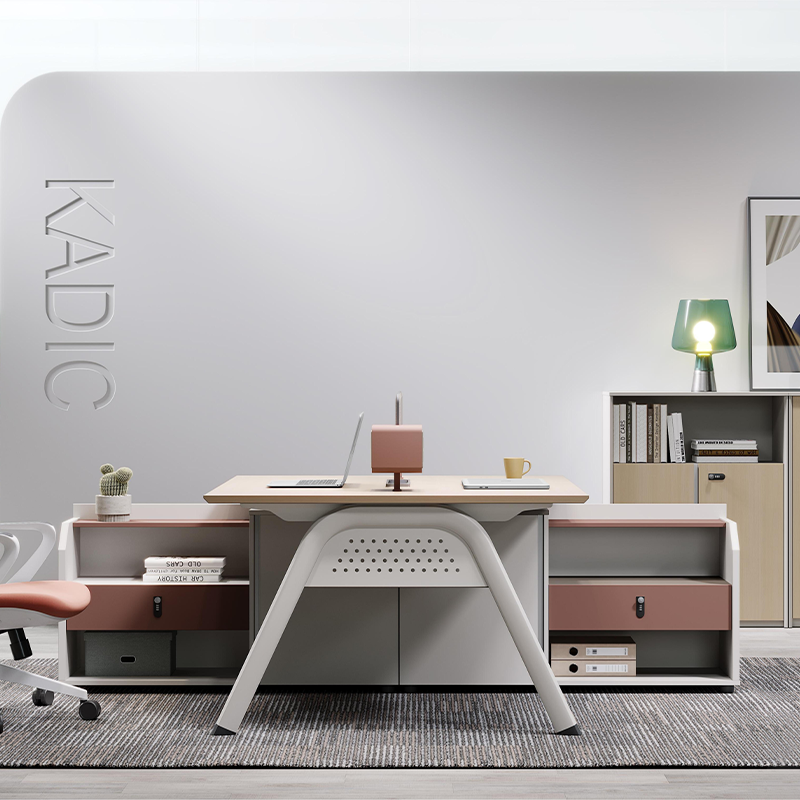میز اداری شما نقش حیاتی در شکلگیری بهرهوری و راحتی شما دارد. میز مناسب از وضعیت بدن شما حمایت میکند، وسایل ضروری شما را منظم نگه میدارد و جریان کار شما را بهبود میبخشد. یک میز بهخوبی انتخابشده میتواند فضای کار شما را به یک محیط کاربردی و الهامبخش تبدیل کند. این راهنمای خریدار به شما کمک میکند تا تصمیمی آگاهانه برای نیازهای خود بگیرید.
انواع میزهای اداری
انتخاب میز مناسب با درک انواع مختلف موجود آغاز میشود. هر سبک میز هدف خاصی را دنبال میکند و نیازهای خاصی را برآورده میسازد. در اینجا تجزیه و تحلیلی برای کمک به تصمیمگیری شما ارائه شده است.
میزهای سنتی رایجترین انتخاب برای صفحه اصلی و تنظیمات اداری هستند. آنها یک سطح صاف برای نوشتن، کار کردن با کامپیوتر یا سازماندهی اسناد ارائه میدهند. بسیاری از آنها با کشوهای داخلی برای ذخیرهسازی همراه هستند. این میزها در محیطهای حرفهای یا مناطق مطالعه که سادگی و کارایی بیشترین اهمیت را دارند، عملکرد خوبی دارند.
میزهای L شکل با ترکیب دو سطح در یک زاویه راست، فضای کاری وسیعی را فراهم میکنند. این طراحی برای زمانی که نیاز به چندوظیفگی یا مدیریت چند دستگاه دارید، ایدهآل است. میتوانید یک طرف را برای کامپیوتر و طرف دیگر را برای کاغذها یا پروژههای خلاقانه استفاده کنید. این میزها به طور کامل در گوشهها جا میشوند و گزینهای عالی برای بهینهسازی فضا هستند.
میزهای ایستاده به بهبود وضعیت بدن کمک کرده و خطرات سلامتی نشستن طولانی مدت را کاهش میدهند. بسیاری از مدلها قابل تنظیم هستند و به شما این امکان را میدهند که بین حالت نشسته و ایستاده تغییر کنید. اگر ارگونومی و سلامت را در اولویت قرار میدهید، این نوع میز میتواند فضای کار شما را متحول کند.
میزهای گوشهای حداکثر استفاده را از فضای بلااستفاده در یک اتاق میکنند. این میزها جمع و جور اما کاربردی هستند و فضای کافی برای وسایل ضروری شما را فراهم میکنند. این میزها برای دفاتر کوچک یا اتاقهایی که فضای محدودی دارند، ایدهآل هستند.
میزهای اجرایی حرفهای و لوکس به نظر میرسند. آنها بزرگتر هستند و معمولاً دارای طراحیهای پیچیده، مواد با کیفیت بالا و فضای ذخیرهسازی کافی میباشند. اگر به دنبال میزی هستید که بیانیهای را ارائه دهد، این گزینهای است که باید در نظر بگیرید.
میزهای جمع و جور برای کسانی که فضای محدودی دارند مناسب هستند. آنها از نظر اندازه کوچکتر هستند اما هنوز فضای کافی برای یک لپتاپ و لوازم اداری پایه را فراهم میکنند. این میزها برای اتاقهای خواب، آپارتمانها یا تنظیمات مینیمالیستی ایدهآل هستند.
نکات کلیدی برای انتخاب یک میز
میز شما باید از راحتی شما در طول روز پشتیبانی کند. به دنبال ویژگیهایی باشید که وضعیت خوب بدن را ترویج میدهند، مانند ارتفاع مناسب و فضای کافی برای پا. ترکیب میز خود با یک صندلی ارگونومیک میتواند تنظیمات شما را بیشتر بهبود بخشد. میزهای قابل تنظیم گزینهای عالی هستند اگر میخواهید بین نشستن و ایستادن تغییر کنید. طراحیهایی را در اولویت قرار دهید که فشار را بر روی مچها، گردن و کمر شما کاهش دهند. یک میز راحت به شما کمک میکند تا متمرکز و مولد بمانید.
در نظر بگیرید که چگونه میز با وظایف روزانه شما هماهنگ میشود. آیا به فضایی برای چندین مانیتور نیاز دارید یا عمدتاً با لپتاپ کار میکنید؟ اگر با مدارک سر و کار دارید، میزی با فضای ذخیرهسازی داخلی میتواند فضای کار شما را منظم نگه دارد. برای پروژههای خلاقانه، ممکن است یک سطح بزرگتر ضروری باشد. میزی را انتخاب کنید که با جریان کار شما هماهنگ باشد تا کارایی را تضمین کند.
قبل از خرید میز، فضای موجود خود را اندازهگیری کنید. میزی که خیلی بزرگ باشد میتواند اتاق را تحت تأثیر قرار دهد، در حالی که میزی که خیلی کوچک باشد ممکن است بهرهوری شما را محدود کند. میزهای جمع و جور در فضاهای تنگ خوب عمل میکنند، در حالی که میزهای L شکل یا گوشهای حداکثر استفاده را از مناطق بلااستفاده میبرند. همیشه عملکرد را با اندازه فضای کار خود متعادل کنید.
میز شما باید با ظاهر کلی دفتر شما هماهنگ باشد. چه طراحی مدرن و مینیمالیستی را ترجیح دهید و چه یک پایان چوبی کلاسیک، سبکی را انتخاب کنید که شخصیت شما را منعکس کند. یک میز بصری جذاب میتواند فضای کار شما را دلپذیرتر و لذتبخشتر کند.
مواد و پایانهای میز
انتخاب ماده مناسب برای میز اداری شما بر دوام، سبک و کارایی آن تأثیر میگذارد. هر ماده مزایای منحصر به فردی را ارائه میدهد. درک این گزینهها به شما کمک میکند تا تصمیمی آگاهانه بگیرید.
میزهای چوبی گرما و ظرافت را به هر فضای کاری میآورند. چوب جامد، مانند بلوط یا افرا، سالها دوام دارد و در برابر سایش مقاوم است. چوب روکشدار گزینهای مقرون به صرفهتر را ارائه میدهد در حالی که ظاهری براق را حفظ میکند. میزهای چوبی مناسب سبکهای سنتی و مدرن هستند و آنها را چندمنظوره میسازد. اگر به دوام و جذابیت کلاسیک اهمیت میدهید، چوب انتخاب عالی است.
میزهای فلزی احساس معاصر و صنعتی را فراهم میکنند. آنها قوی و مقاوم در برابر آسیب هستند و برای استفاده سنگین ایدهآلاند. بسیاری از میزهای فلزی دارای پوششهای پودری هستند که از زنگزدگی و خراش جلوگیری میکند. این میزها معمولاً با مواد دیگر، مانند چوب یا شیشه، برای ایجاد یک زیبایی ترکیبی به خوبی جفت میشوند. فلز بهترین گزینه است اگر به یک گزینه با دوام و کمنگهداری نیاز دارید.
میزهای شیشهای ظاهری تمیز و باز ایجاد میکنند. آنها نور را منعکس میکنند و فضاهای کوچک را بزرگتر نشان میدهند. شیشه نشکن ایمنی و دوام را تضمین میکند. این میزها معمولاً شامل فریمهای فلزی برای ثبات بیشتر هستند. میزهای شیشهای به خوبی در تنظیمات مدرن یا مینیمالیستی جا میشوند. با این حال، آنها نیاز به تمیزکاری منظم دارند تا ظاهر شیک خود را حفظ کنند.
نتیجه گیری
انتخاب میز اداری مناسب شامل تعادل بین راحتی، کارایی و سبک است. فضای کار، وظایف روزانه و ترجیحات شخصی خود را ارزیابی کنید. ویژگیهایی را در اولویت قرار دهید که بهرهوری را افزایش میدهند و با بودجه شما مطابقت دارند. قبل از خرید اندازهگیری کنید تا از بروز شگفتیها جلوگیری کنید. مواد و نظرات را بررسی کنید تا از دوام اطمینان حاصل کنید. با این مراحل، شما با اطمینان فضایی کاری ایجاد خواهید کرد که برای شما مناسب است.





